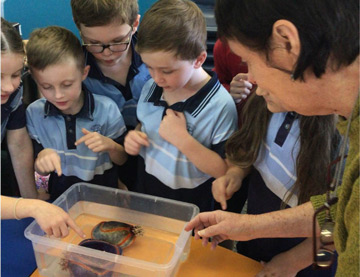Banner Image

Each year the team at Ocean Life Education braces itself for an exciting (and busy!) SeaWeek. We love the increased focus on all thing’s ocean every March and it’s a popular time to book our inspirational live marine animal incursions – and excursions.
We promote SeaWeek alongside other key ocean dates in our popular annual Ocean Events Calendar that we offer as a free download for all, enabling teachers and event organisers to plan their year ahead and focus on dates that most suit their interests.
https://www.oceanlifeeducation.com.au/ocean-events/
We also offered our Online Shark Course for free during SeaWeek 2024, attracting a huge number of bookings from shark and ocean enthusiasts keen to check out all the videos, infographics, facts, and quizzes and boost their knowledge about sharks.
This year’s SeaWeek theme centres around Ocean Literacy Principle 2: The ocean and life within it significantly influence the Earth’s features. This is all about focusing on our relationship with the natural world and the fact that healthy seas mean healthy people. So, educating children and inspiring them to take some responsibility for the health and well-being of our coastal and marine environments is a great place to start!
Due to its vast biodiversity and the fascinating array of life forms it is home to, the ocean offers the perfect platform for teaching a range of curriculum science topics. It introduces young learners to the diversity of species, from microscopic plankton to massive whales and amazing sharks, captivating their imagination and fostering a sense of wonder about the natural world. We love to see children’s reactions when we tell them incredible facts about ocean life and show them how our fascinating ocean creatures have adapted and reproduce.
Studying marine life allows children to understand fundamental biological concepts such as adaptation, symbiosis, classification, and life cycles. They can observe firsthand how organisms have evolved unique traits to survive in diverse ocean habitats, promoting a deeper appreciation for the interconnectedness of living organisms and their environments. It also provides opportunities for hands-on exploration and discovery, whether through observing tide pools on excursions, or analysing live marine animals in class.
Discussing topics such as pollution, climate change, and ocean conservation and the impact of human activities on marine ecosystems prompts discussion and instils in children a sense of environmental responsibility, empowering them to make informed decisions about preserving our precious oceans for the future.
https://www.oceanlifeeducation.com.au/programs/
